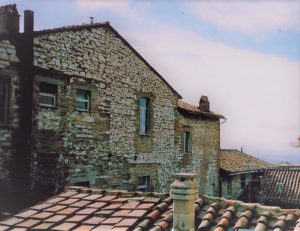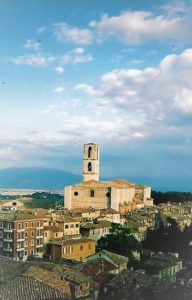I went a little too heavy on vinegar and salt when making a simple salad. It reminded me of the food at the mensa, the cafeteria for the two universities in Perugia, Italy. I went there with friends only a few times. However, I remember the salad well. The Romaine lettuce was always fresh. But, somehow, the dressing was always salty, oily and very acidy. The lady behind the counter serve the food swiftly. Their utensils, hitting on the mixing bowl, created a chaotic atmosphere.
I lived in Perugia for a little over six months, attending language classes at Università per stranieri. Between late September, when I first arrived, and early November, I moved three times. Although the school brochure indicated that students could be placed with Italian families, the only thing available upon my landing was a sublease, one room in an apartment over ten-minute walk from school. With winter months fast approaching, when I heard that a spot in an old building near school opened up, I quickly took it.
I shared a big room with two young girls from Taiwan. The land lady would not allow any visitors. Day and night, she looked out from her window overlooking the stone path, making sure no strangers passing through her gate. I was her darling until I told her that I found a better place and would move out by the end of the month. She rampaged through all my drawers and suitcases when I was at school, just to make sure that I was not stealing from her.
I couldn’t be happier moving into a two-bedroom apartment on the top floor of a family-orientated building. A fresh coat of white paint was applied to brighten up the entire apartment. With high ceiling and sparsely furnished, my room was spacious and echoey. My roommate was a fifteen-year-old girl from Central Taiwan, extremely homesick and very quiet. I was home a lot, preparing for my dissertation. Often, the only sounds in the apartment were news broadcasts or music coming from my radio.
In comparison to my room, the galley kitchen seemed unusually small. Even the white appliances and brand-new cabinets couldn’t make it appear bigger. In those days, my budget was very tight. The living costs seemed impossibly high. Other than cabbages, carrots, onions, tomatoes, pasta and flours, I could afford very few things. To make life more tolerable, I would invite a few newly-met friends over. We would find the most creative ways to cook with limited ingredients. The fire and the boiling water would quickly warm up the space. The results of our experimental recipes would often make us laugh. Those were the happy moments of that long winter.
On sunny days, I loved to open the windows in the kitchen, looking over terracotta rooftops to find a little piece of blue sky. The view always reminded me of Mimì’s descriptions of her little place:

Vivo sola, soletta,
là in una bianca cameretta:
guardo sui tetti e in cielo;
ma quando vien lo sgelo
il primo sole è mio*
I live alone, all alone,
there in a white little room:
I look over the roofs and in the sky;
but when the snow-melt arrives,
the first sunshine is mine.

By the end of my six-months sojourn in Italy, I only began to understand the langue, the people and the beautiful country. Yet, I learned from those months how a beam of sunshine could warm up one’s heart and drive away one’s wearies. I miss the cerulean sky of Italy.
*La Bohème, Act I, Giacomo Puccini; Libretto by Luigi Illica and Giuseppe Giacosa.
